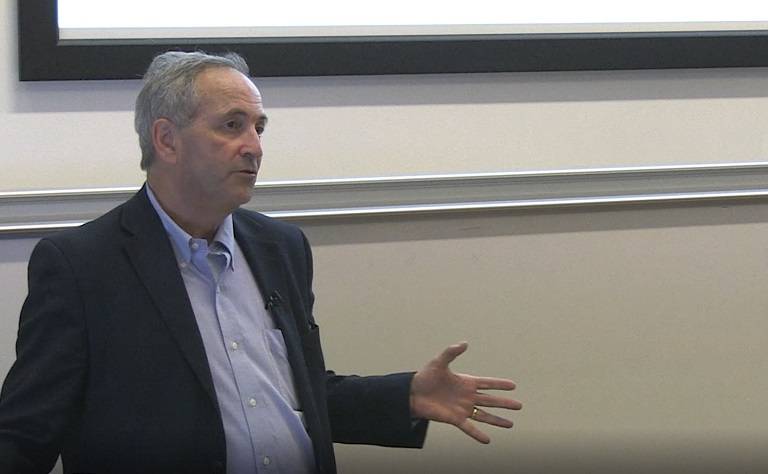The World in 2017
23 March 2017
Tobia Charles (MSc Global Governance and Ethics) on the GGI keynote lecture with Daniel Franklin, Executive Editor of the Economist.

In light of the seismic political shocks which forced us to question the pre-eminence of liberal internationalism in 2016, I was rather surprised at the largely optimistic tone of Daniel Franklin's talk at the Global Governance Institute (GGI). One would think that the Executive Editor of a publication regarded as one of liberalism's staunchest advocates would make far bleaker predictions for 2017. Perhaps I am guilty of transference, unable to see the light at the end of 2017's tunnel - both 'real' and 'fake' news will do that to you at the moment.
In any case, the talk was riveting to say the least. Although there were some notable (perhaps inexcusable) omissions, including the refugee crisis and climate change, Franklin's enthralling countdown through the year ahead covered a vast array of subjects: from terrifying elections, to 'robot shrinks', to a new Chinese gambling class and, of course, the Trump factor.
10. Known knowns: anniversaries in 2017
Guess what: it has been 500 years since the Protestant Reformation! I know, it feels like only yesterday that religious intolerance was rife across Europe, causing political upheaval left, right and centre (excuse the pun). One can only hope (unless you are Marine Le Pen) that shocks of this magnitude are not periodically scheduled every half millennia.
Undoubtedly, the most pertinent of this year's commemorations is the 100 year anniversary of Lenin's 1917 October Revolution. Franklin pointed out that this will be intriguingly tricky for Putin: He will have to balance widespread Soviet nostalgia with his own brand of contemporary kleptocratic authoritarianism that many of Lenin's revolutionaries would have surely despised.
Some other notable anniversaries include: 50 years since the first human heart transplant, 150 years since the publication of Das Kapital, 50 years since the death of Che Guevara, and 10 years since Steve Jobs launched the iPhone.
On a lighter note, it has been 50 years since H-Day, the day traffic in Sweden switched from driving on the left hand-side to driving on the right - despite the fact that, in a national referendum, the overwhelming majority of Swedes had voted to keep driving on the left. Franklin quipped: "There's a lesson in there somewhere".
9. Elections to watch
If 2017 is to be the year of upheaval that all these anniversaries would suggest, then Franklin framed France as the epicentre of this impending political earthquake. Whilst Germany's election is of considerable importance, it does not pose any serious threat to European integration. Similarly, in Italy, which might see an early election in 2017, burgeoning levels of debt could threaten the resilience of the Eurozone but not so much the political union. However, a Le Pen victory would plunge Europe into an existential crisis, possibly reducing our definition of Europe into merely geographical terms. Antithetically, a victory of Macron, with his open embrace of European values, has the potential to restore some belief in centrism and reinvigorate the greater European ideological project.
Outside of Europe, South Koreans will soon go to the polls to find a successor for the recently impeached Park Geun-Hye. This election is likely to be significantly shaped by the actions of North Korea's leader 'You-Know-Who', including the increasing frequency with which he is testing ballistic missiles. Given Trump's incendiary criticism of Obama's nuclear deal with Iran and his recent pivot back toward Israel, Franklin duly highlighted that Iran's presidential election this year is also likely to be of major geopolitical significance.
Even though it is not an election - those things only happen where you have more than one party - in autumn, the world will look to Beijing for the 19th National Congress of the Communist Party of China. The event will provide President Xi Jinping with the opportunity to lift even more of his closest confidants into senior positions, fashioning a grip on power tighter than any of his predecessors in the post-Mao era, maybe apart from Deng Xiaoping.
8. Venezuela's faltering economy
Venezuela is crumbling. The Economist predicts a growth rate of minus 8% for 2017, making it a tough year for the Maduro regime.
7. Waves of M&A
There is a theory suggesting that globally, since the late nineteenth century, we have experienced seven waves of mergers and acquisitions (M&A). Although we see a gradual swelling of M&A over time, there are periods of surges, followed by periods of reduced M&A activity. Franklin posited that 2017 could mark the end of the latest wave of M&A. The increasing political resistance to M&A, in particular Chinese investments, and the breakdown of the Kraft-Unilever merger all indicate that Franklin's prediction holds weight. Investors are likely to start looking at the next wave, especially in Europe, where Franklin believes M&A is badly needed to restructure and enhance global corporate competition. The Peugeot takeover of Vauxhall then, would seem like a step in the right direction.
6. Brexit
It is clear that Franklin is no fan of Brexit. During the Q&A session, he suggested that any positive outcome would involve single market and customs union access, both unforeseeable eventualities given that 'Theresa Maybe' (The Economist's joke, not mine) believes that a soft Brexit would represent a betrayal of 'the will of the British people' (or at least the will of the 52% that bothered to vote). Franklin even suggested it would be good to have a deal at all, which seems to be a remarkably low threshold for success.
Franklin identified six factors that would determine whether the 'Brexit pendulum' would swing more towards 'hard' or 'soft' - or, as I would put it, 'bad' or 'less bad'. These were: the economy's performance, foreign investment, migration figures, Westminster turf wars (I am assuming by this he means Tory infighting as Corbyn has little chance of taking anyone's turf), our European negotiating partners, and, lastly, public opinion. Franklin predicted that after Article 50 is triggered, public opinion could swing toward a softer Brexit as the true economic implications of a hard Brexit become clearer. I think, however, he underestimates the power of the tabloid press in influencing public opinion and perpetuating what now looks like a global propensity for legislative self-harm.
5. New job categories
The monumental technological advancements made in recent years are often misconceived as a threat to low-skilled labour. Franklin indicated that, although adaptation might be a painful process in some sectors, scientific innovation ultimately creates more specialised roles in the management and maintenance of highly technological infrastructures. He pointed to a US Bureau of Labor forecast which projects that 'wind turbine technician' could be the fastest growing job over the next ten years. Drones provide another example: while their civil use may pose a threat to some sectors (e.g. delivery), they create a wide range of possibilities not just for drone technicians but also for people working in environmental monitoring, disaster relief, and other fields.
Technological advancement in healthcare will also see the advent of highly specialised medical professions such as synthetic tissue engineers. Stem cell research is pushing the boundaries of what we only recently thought to be within the realm of science fiction. Personalised targeted medical therapies are also on the horizon due to the astounding efficiency gains made in DNA sequencing.
Looking at the future of public health from a more dispiriting angle, an expansion in social care services is urgently required. The intense strain that the NHS is under has been well-publicised in recent months, less so has its root cause - the population is ageing at a rate that current public health infrastructures are quite simply unable to support. Franklin purported that, this year, we are likely to see an expansion in professional social care. Sadly, in light of the recent budget, I think it is unlikely to be in the public sector.
4. Ways in which tech is getting more personal
As if Siri and Amazon Echo just were not Minority Report enough, computers will soon be able to judge moods on the basis of facial expressions or tone of voice. Franklin even prophesied 'robot shrinks' might be able to take psychological temperatures... One for the Democrats, I think. Though, in all seriousness, it has been ten years since the iPhone was released, Hollywood has a knack for delineating a path for technological advancement, and virtual Personal Assistants like Amazon Alexa seem to be next on the Silicon Valley agenda.
3. Reasons to be fearful
Without trying to sound any more like a survivalist than I already have in this piece, Franklin used the words 'doomsday', 'clock' and 'ticking' in the same sentence! Although there might not be a need to worry just yet, there are signs that the nuclear threshold is lower than it was, including Putin's open talk about the use of tactical nuclear weapons.
2. Emerging market giants
Importantly, of the ten countries that are predicted to have the highest growth rates this year, none will achieve double digits, reflecting weaning global growth more generally. China did not find itself in this year's top 10 but, unsurprisingly, Franklin believes it still wields the greatest power of any of the emerging nations. If China's growth rate is unlikely to return to dizzying heights that is because the nature of its growth has changed. Franklin used two examples to illustrate the increasing importance of the Chinese middle class. First, the Chinese box office is set to overtake the American box office this year. Second, gambling revenues in Macau (if you will, the Chinese Las Vegas) showed a decline in 'high roller' revenues and an increase in 'mass market' revenues, reflecting both the president's crackdown on corruption and an increase in gambling across a wider economic demographic.
1. Donald Trump
I do not really need to bore you with the implications of this. 'President Agent Orange' and his fake news will dominate the papers every day (actually, not the papers, people do not read those anymore). Franklin argued that three Us aptly characterise the Trump presidency: Unconventional, Unpredictable, and Uncomfortable. I would probably add a fourth U to this: Unwell. Trump is a few alternative facts away from being impeached on the grounds of being a psychopath. The recent wiretap claims are just another example of how the situation is steadily spiralling out of control - if a 'steady' spiral out of control is even possible. Alternate realities cannot last 4 years… or can they?
Some concluding thoughts
I realise that Franklin could not possibly cover everything he would hope to in one hour, so this was necessarily a cursory look at the year ahead. Nevertheless, I feel that climate change is an issue that would have deserved more attention. During the Q&A session, Franklin indicated that Trump would not be able to derail the global climate strategy, pointing to the power of federal states to act independently on climate change. However, I feel that given the highly fragmented and unbinding architecture of the Paris Agreement, we cannot rule out a domino effect if a state wilfully neglects its ecological commitments and even denies the very existence of a common cause for climate action - especially if this country is the world's second biggest polluter.
 Close
Close


